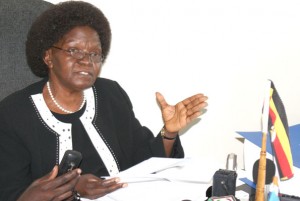The Ministry of Education and Sports, is considering giving students joining university loans to pay fees as one of the ways to increase equitable access to higher education.
The Minister of Education and Sports, Geraldine Namirembe Bitamazire told the Parliamentary Committee on Social Services that this is part of the 10-year Education Sector Strategic Plan. “Our target is to increase access to higher education. Having increased access to primary and now secondary education, it is important that we start planning how to increase access to higher education,” Bitamazire says.
The minister’s announcement came at the heels of calls by academicians attending the June 2007 8th Women Affairs Ministers Meeting (WAMM) in Kampala to governments and universities in Africa to consider giving student loans in order to increase access to higher education by disadvantaged groups like women, the poor and those from rural areas who find it hard to compete equitably for the 5, 000 government scholarships in the now 5 public universities of Makerere, Gulu, Mbarara, Kyambogo, and Busitema.
Presenting a paper on Affirmative Action and Financing Women’s Education, Prof. Joy Kwesiga, the Vice Chancellor of Kabale University said that student loans can be an effective avenue to enable bright students from rural areas, poor families and females to get higher education.
Some people however see the latest move by government as an excuse for its planned decrease to fund higher education in favour of primary and secondary education.
Others however argue that apart from ensuring that the beneficiaries of higher education and training meet part of their education in the face of limited resources at government’s disposal, student loans promote equality of opportunity to qualified students irrespective of their background circumstances.
“Student loans are a fair institution to finance bright but disadvantaged students to access higher education. Governments and Universities can provide bank guarantees and ways of claiming back the money. They can work with the private sector to find work for those who get the loans so that they can pay back the money,” Kwesiga told Ultimate Media.
The Visitation Committee instituted by President Yoweri Museveni to find ways of improving education in Uganda’s Universities also recommended that government should introduce the Student Loans Scheme immediately.
“An equitable standard loan scheme based on those operating successfully in counties such as Ghana, UK, Canada and Kenya would ensure access to university education by all qualified students irrespective of their income,” the committee said in their report submitted to President Museveni recently.
Neighboring Kenya has been running a University Students’ Loan Scheme (USLS) which benefits both students studying in government and private universities. But some people are worried that Uganda’s experience with the Entandikwa Scheme where people countrywide were borrowed money and they never paid pack might replicate in the Student Loans Scheme. It is only recently that Kenya after more than 40 years of the Scheme found effective means of ensuring students pay back the money that is loaned.
“The Entandikwa failed totally to work. It backfired completely on government. How do they expect this to work? It can only work in a situation where government is certain that the students will get the jobs. There is no way that you can expect students to get jobs and make them pay back these loans,” says Aswa County MO, Reagan Okumu. He also says that if the Students’ Loans Scheme is to work, the interest should be friendly.
East Moyo MP, Piro Santos also says that while the Students’ Loan Scheme is good, the current high levels of unemployment make it unsustainable since government can not be sure the students who are loaned money will get jobs and pay back.
“Is there a deliberate policy that after finishing university, these students will be accorded jobs? As far as I know, these students are trained by the universities and thereafter, the students are left to look for the jobs themselves. The job market in Uganda does not have enough vacancies for them. There is no absolute guarantee that the students will get the jobs. For now, this scheme might is unworkable, especially here in Uganda,” he said Santos told Ultimate Media in an interview.
But Prof. Kwesiga says government and universities can find a system of giving these students as trained and skilled people work, even if on part time to ensure that the loans are paid back. She says some parents who can’t pay the high tuition fees for students at once might afford the soft loans, which they can pay back in installments over a loger period of time.
During the 8WAMM, Cornelia Muganda, from the Open University of Tanzania says that they already have a system where students from disadvantaged families access loans and pay back through working at the university, while others provide goods and services to the university.
“In addition to student loans, we also run a bridging programme where we train women and people from rural schools who didn’t get direct entry to university so that they can be at par with others. These end up performing better than those who gained direct entry because they were from better schools,” Muganda says.
Prof. Kwesiga says that as most affirmative action policies to increase the number of females, the poor, and those from rural areas have become unpopular for not giving opportunity to all and many times benefiting the already advantaged, a student loans scheme is needed to ensure the disadvantaged access higher education.
By Olive Eyotaru, Ultimate Media


